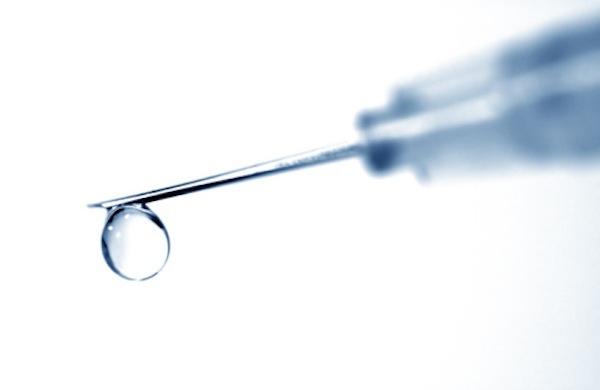
Is it possible to inject motivation? Many people seem to think so, judging by the popularity of B12 injections at weight-loss centers around the country. Delivered in a rosy pink serum, vitamin B12 helps the body to regenerate red blood cells and maintain the central nervous system.
Now, to be clear: a B12 injection won’t cause weight loss itself. The treatment is rumored to have energizing benefits that encourage weight loss. The thinking is that more energy means an easier time keeping up with a diet and exercise regimen. But it’s important to note that not everyone will gain energy from the shot.
Vitamin B12’s association with a boost in energy came in the early 20th century, when doctors realized that a dose of B12-rich liver juice (yum!) could cure a problem known as pernicious anemia—a condition that occurs when the body has difficulty with B12 absorption. Once the patients finished their liver-drink, their fatigue evaporated, and they returned to their lives of jitterbugging and knocking secret codes on speakeasy doors.
If you are too young to remember New Coke, in fairly good health, and an omnivore (in its natural form, B12 is present in food that comes from animals), your B12 levels are probably fine. Pernicious anemia is most common in older adults and pretty rare in those younger than 30. You don’t have to be anemic to experience a similar sluggishness, though—any B12 deficiency can sap energy and is best treated with a healing dose of the vitamin. Vegans and vegetarians, for instance, don’t get much of the vitamin from their plant-based diets and can be good candidates for B12 injections.
Let’s say your B12 levels are normal. Is it unhealthy to get an injection and have an excess of B12? Well, like vitamin C, vitamin B12 is water-soluble, so your body will likely flush out any extra before the concentration gets to toxic levels. There’s no scientific evidence that bonus B12 in your system will give you extra energy, but there’s also no harm in it if you choose to go that route.
If you’d rather skip the needle, however, here are other ways to get an energy boost without a trip to the clinic.
Eat the Right Food
A non-vegetarian Western diet provides more than enough B12 to keep the body at normal levels—eat a decent amount of meat and fish, and you’ll be fine. But to stay lively, you should also avoid food that’s high in simple sugars and refined starches. Whole grains, high-fiber vegetables, and nuts are digested more slowly than a midafternoon bag of chips or gingerbread house, giving your system the fuel to prevent a crash later.
Get Some Exercise
The benefits of exercise, even the low-intensity kind, are too numerous to mention. Whether you pump iron or just take a 20-minute walk during a lunch break, physical activity will make you sleep better, circulate more oxygen to your cells, and release energizing hormones—all things that drive away feelings of lethargy and exhaustion.
Take a Nap
To get the most out of an afternoon snooze, you need to time it with your body’s natural sleep cycle. Limit the nap to 10–20 minutes, and you’ll enjoy the kind of sleep that results in boosted alertness, mood, and motor skills. Sleep for 45 minutes or less, and you add creativity and sensory benefits to the mix. For a long nap, stretch it out to 90 minutes—this takes the brain through every sleep stage, allegedly leading to a clear mind and a sharp memory.
Drink Your Coffee Right on Time
Our bodies make their own energy drink. It’s called cortisol, and it’s responsible for making us feel alert. Like any hormone, cortisol follows its own rhythms, peaking at certain hours and dipping at others. That means that if you drink your cup of java when your cortisol levels are tapering off, you’ll get the most out of the caffeine and potentially feel energized all day. For those with a 9–5 job, the golden hours for coffee breaks are 9:30 a.m.–11:30 a.m. and 1:30 p.m.–5 p.m. If you get up earlier or later, adjust your hours accordingly.
Read our FAQs about B12 injections:









